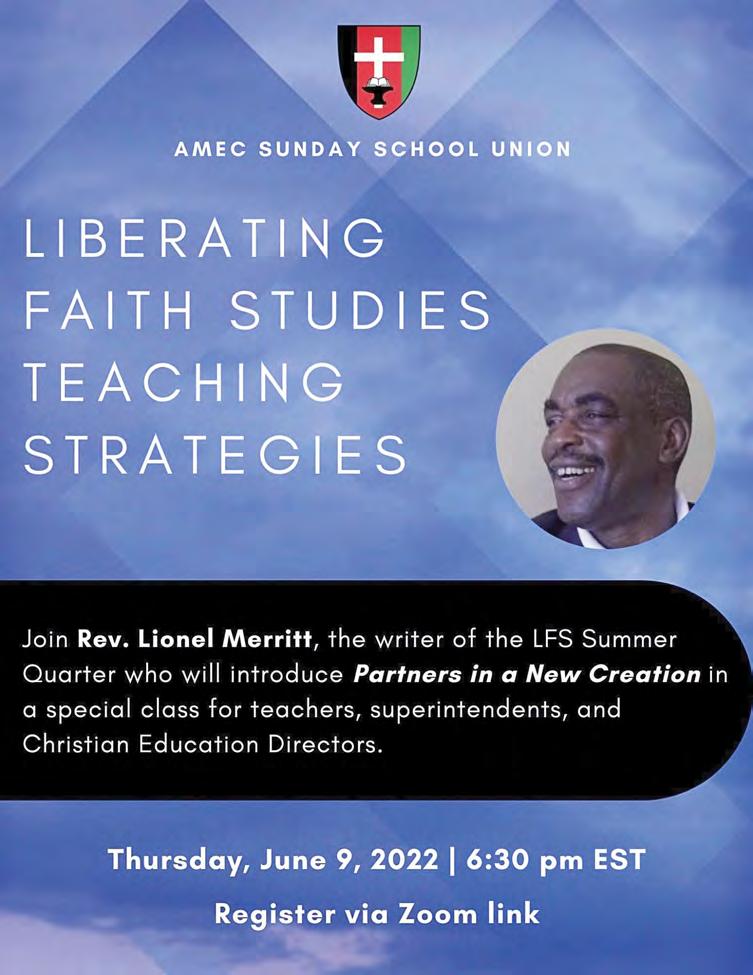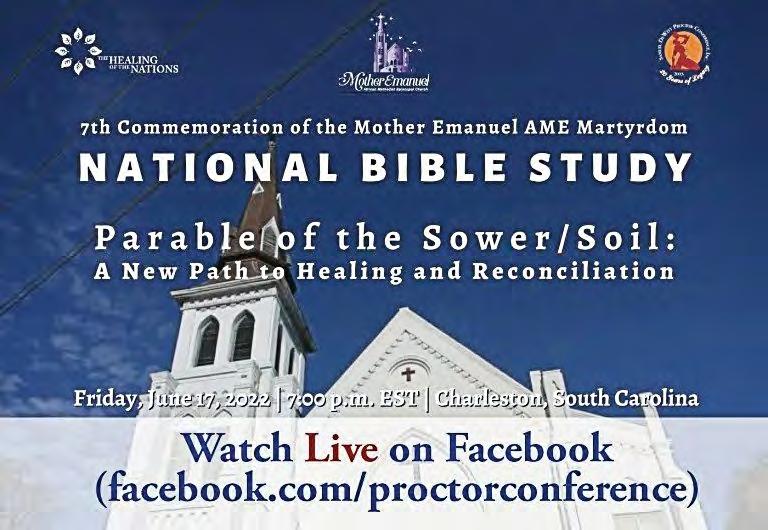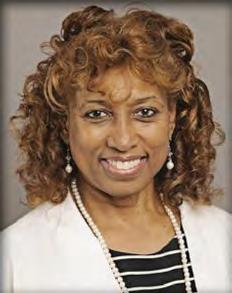
22 minute read
Mothers of the Nations and the Significant Emergence of Judge Ketanji Brown Jackson
Mothers of the Nations and the Signifi cant Emergence of Judge Ketanji Brown Jackson
Angelique Walker-Smith
Advertisement
At that time Deborah, a prophet, wife of Lappidoth, was judging Israel. —Judges 4:4 Before Judge Ketanji Brown Jackson—or any of the people who have served or currently serve on the U.S. Supreme Court—there were judges like Deborah in the Bible. She lived from approximately 1107 B.C. to 1067 B.C. and was known as a prophetess, a wife to Lappidoth, and a judge and “a mother in Israel.” The Brazilian Old Testament scholar Dr. Claude Mariottini states: “Deborah became known as ‘a mother in Israel’ because she was regarded by the people of Israel as a woman of exceptional character, a woman who used her skills to help the people and to defend her nation, a woman who identified with the people in their suffering, and a woman whose strong leadership aroused the leaders of the tribes of Israel to resist their oppressors and whose enthusiasm inspired the people to rise up to fight for their nation.” Sadly, Deborah is the only woman referred to as “a mother in Israel” in the Old or New Testaments. But I propose there are many “mothers of the nations” today—women who have been and continue to be resilient and committed to Dr. Mariottini’s description of what Judge Deborah stood for. Mother’s Day is a day when the public celebrates this. The day is celebrated in more than 50 countries, although not all countries celebrate it on the same day. At the same time, “mothers of the nations” remain underrepresented in publicly elected or appointed roles of national governance. This challenge is particularly acute when considering the few numbers of African women and women of African descent. As of January 3, 2021, black women comprised less than 5% of all members of the United States Congress; black women comprised only 18% of all women in Congress and only 43% of black members of Congress. From when Shirley Chisholm (D-NY) became the first black woman elected to Congress in 1968 to the start of the 117th Congress, just 47 black women have served in Congress from only 21 states. It was only in 2020 that we elected our first woman to the vice presidency in the United States, former Senator Kamala Harris, who is of African and Indian descent. Beyond our shores, there have only been ten acting, interim, or elected women presidents in Africa out of 54 African nations. In addition, only five African countries have had a woman Supreme Court judge. Only recently has the United States confirmed its first woman of African descent as a Supreme Court justice, Judge Ketanji Brown Jackson—but not without challenge. Her contested emergence reminds us that advocating for change to racialized gender disparities is not easy, but doing such moves us closer to ending hunger and poverty. Bread for the World celebrates the leadership of past, present, and future “mothers of the nations” and invites you to advocate with us at the upcoming Bread for the World Advocacy Summit/Pan African Consultation, June 6 - 7 at www.bread.org/ advocacysummit. Angelique Walker-Smith is a senior associate for Pan African and Orthodox Church engagement at Bread for the World.
Brown Chapel AME Church in Selma Tops List of America’s 11 Most Endangered Places
In May, the National Trust for Historic Preservation unveils its much-anticipated annual list of America’s 11 Most Endangered Historic Places. The eleven sites on the 2022 list represent a powerful illustration of expansive American history. The wide range of cultures, histories, and geographies highlighted through the 2022 list help illustrate how telling the full story can help people see themselves reflected in our country’s multi-layered past. “This year’s list illuminates elemental themes that have framed the story of our nation—the quest for individual freedom, the demand for fairness and equal justice, the insistence to have a voice in society, and the ongoing struggles to make these dreams a reality,” said Paul Edmondson, president of the National Trust for Historic Preservation. “These places give us a better understanding of our nation’s complex history and allow us to explore the ideas that continue to challenge us today. And, with each year’s list, we are making greater strides in our effort to expand the work of preservation to tell the full American story.” Annually, this list spotlights important examples of our nation’s architectural and cultural heritage that, without applied action and immediate advocacy, will be lost or face irreparable damage. Due to the efforts of the National Trust and the passionate work of our members, donors, concerned citizens, nonprofit and for-profit partners, government agencies, and others, placement on the 11 Most list is often the saving grace for important cultural landmarks. In the 35year history of the America’s 11 Most Endangered Historic Places list, less than five percent of the more than 300 places spotlighted have been lost. “These eleven endangered places are facing critical turning points, and if they are lost, we will have lost an important part of our collective story,” said Katherine Malone-France, the National Trust’s chief preservation officer. “By including them on this list, we have an opportunity to recognize their significance and fight to protect them, rather than watching them disappear from our national landscape and fade into memory. Through this year’s list, we help broaden American identity through places that tell the profoundly important stories, but many of them have been historically overlooked or deliberately obscured. Once remembered and recognized, they enrich and deepen our understanding of ourselves as individuals and as an American people.”
Brown Chapel AME Church in Selma, Alabama,
played a pivotal role in the Selma to Montgomery marches that were instrumental to the passage of the Voting Rights Act of 1965. Built in 1908 by formerly enslaved black builder A.J. Farley, Brown Chapel provided sanctuary to Civil Rights activists and church members as they convened to plan protests against African American voter disenfranchisement. It also served as the starting point on March 7, 1965, when marchers—including the late Congressman John Lewis—attempted to cross the Edmund Pettus Bridge, only to be beaten back by Alabama state troopers in an event historically known as “Bloody Sunday.” The recent discovery of severe termite damage has forced Brown Chapel to close its doors to its active congregation and visiting the public for the foreseeable future. This closure impacts the church’s ability to serve its community. It leaves this National Historic Landmark and internationally known Civil Rights pilgrimage site unable to serve as a community resource, welcome guests, or host national events. Although Brown Chapel has received funding and support from the National Park Service, the church needs additional funding to repair and re-open the building, which typically hosts thousands of visitors per year and offers weekly worship services and outreach programs such as community food distribution and COVID-19 support. Therefore, the historic Brown Chapel AME Church Preservation Society, Incorporated, is seeking partnerships, resources, and support to ensure this sacred site can continue to serve its community and the nation as a beacon of hope for change and equality. ❏ ❏ ❏
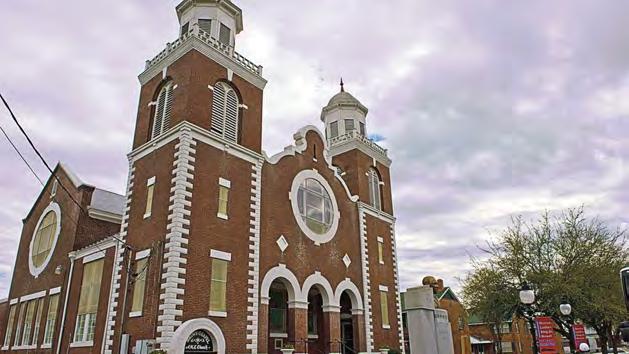


CONGRATULATORY Announcements

*Purple font connotes Episcopal Family; Red font, General Officers; and Blue font, Connectional Officers.
MAY 2022
AME Minister the Reverend Dr. Dee Dawkins-Haigler, Candidate for Georgia Secretary of State Receives Noble Peace Prize Nomination for Global Leadership
Dee Dawkins-Haigler, Democratic Party, is running for election for Georgia Secretary of State. Dawkins-Haigler is on the ballot in the Democratic primary on May 24, 2022. DawkinsHaigler (Democratic Party) was a member of the Georgia House of Representatives, representing District 91. Dawkins-Haigler assumed office in 2008. Dawkins-Haigler left office in 2017. The Honorable Roysdale A. Ford, member of Parliament in Guyana and one of her nominators for the Peace Prize, states, “Dr. Dee DawkinsHaigler has been instrumental in the fight for Afro Guyanese gaining full access to government and global resources. She has been an ally in trying to ensure that equitable, sustainable economic development is achieved for all Guyanese, which would level the playing field and get many Afro Guyanese people back to work and out of poverty.” The Honorable Dee Dawkins-Haigler is a champion for women and girls empowerment and continuously works on behalf of assisting vulnerable populations throughout the global village, states Representative Laura Hall (AL), president-elect of the National Black Caucus of State Legislators (NBCSL), who recently presented a resolution to Dawkins-Haigler in the Alabama House of Representatives. Representative Hall has accompanied her to countries such as Nigeria, Guyana, and United Arab Emirates and knows firsthand the work she does to eradicate poverty by providing for orphans and empowering widows with micro-grants to help them start small businesses with proceeds from two of her literary works - A Message to Our Daughters: Turning Trials in Triumphs and Empower Her: Innovation, Entrepreneurship and Development. Dawkins-Haigler, a Goodwill ambassador and global connector, not only travels extensively throughout Africa and the Caribbean, she also facilitates visits from world leaders to visit Georgia, New York, and Washington, D.C. to further build diplomacy and trade. Dr. Ken Giami, publisher of African Leadership Magazine, the largest and most respected publication centered around global leadership in the world, states it best, the Honorable Dee Dawkins-Haigler has a unique way of making everyone feel that we are truly a global village by bridging the gap between those on the continent of Africa with those living in the diaspora. She has been an ally as it relates to diplomacy and creating strategic economic partnerships to help close wealth gaps for people of African descent.
She dedicates her life to fighting for social justice and human rights issues that promote peace and economic stability. She is hailed as a champion and catalyst for systemic change by working with various world leaders and political regimes throughout Africa and the Caribbean, assisting them with tangible ways of achieving the Sustainable Development Goals (SDGs) outlined and approved by the United Nations. Her work has focused on the eradication of poverty, gender equality, affordable and clean energy, and quality education to just name a few. Dee is the founder/president of the Organization of World Leaders (OWL), a consortium of leaders in government, law, business, health, finance and politics dedicated to working together to build alliances for economic sustainability and growth in Africa and the diaspora. She is also the chief ambassador to the United Nations in consultative status with the Economic and Social Council (ECOSOC) for the Center of Economic Leadership and Development (CELD) in New York, Geneva, and Vienna. She is the founder of One Georgia which is dedicated to bringing together clergy, elected officials, social and civic groups, Civil Rights organizations, and fraternities and sororities for the collective purpose of promoting issues salient to the African American and Hispanic communities with a special emphasis on economic justice and parity. In addition to the above work, Dee is the organizer of the Minority Cannabis Coalition (MCC), an organization dedicated to promoting equity and access in the cannabis industry. Dee is an advocate in the fight against human trafficking, domestic violence, and teen dating violence which led her to produce the documentary/drama “Black Girls Die Too: The Back Page Murders,” which chronicles the death of fourteen black women murdered as a result of using online human/sex trafficking websites such as Back Page. Dee is a member of Delta Sigma Theta Sorority, Inc., Top Ladies of Distinction, National Council of Negro Women, and the Order of Eastern Star. She is a past regional officer for Jack and Jill of America and is president of the East Metro Orchids. Dee resides in Lithonia, Georgia. She is married to her college sweetheart, Colonel David Haigler, Jr. and they have four children: Christopher, Christyn, Hannah, and Joshua, and two grandchildren, Amari and Kingston. She is an ordained elder in the African Methodist Episcopal Church, celebrating 25 years in ministry, and serves at First Saint Paul AME Church, Lithonia, Georgia, in the 6th Episcopal District, the Rev. Dr. Marvin Crawford, pastor. Messages of commendations and congratulations can be emailed to: dawkhaig7@aol.com.
Dr. Herman O. Kelly, Jr. Named a Game Changer by Humana at the 2022 Senior National Games in Ft. Lauderdale, Florida
Dr. Herman O. Kelly, Jr. was named a game changer by Humana at the 2022 Senior National Games in Ft. Lauderdale, Florida. He was one of 12 named and one of two swimmers named for this award. The award is given every two years at the Senior Games to persons who work toward healthy living and community service. Dr. Kelly has competed in two senior games, and he has an annual fundraiser for cancer, entitled Swim For Linda.
Presently, he is seven-time state champion in the Louisiana Senior Games. This prestigious award is given to persons 50 and over who work hard toward exercise and healthful living. Dr. Kelly is the pastor of Bethel AME Church in Baton Rouge, Louisiana. Congratulatory comments can be emailed to: spidermh7@yahoo.com.
The Rev. Dr. Mark L. Griffin Honored by the Step-by-Step 4 Help Foundation, Inc.
Congratulations are extended to the Reverend Dr. Mark L. Griffin on the occasion of being honored by the Step-by-Step 4 Help Foundation, Inc. with their 2022 Community Hero Humanitarian Award at their Shades of Green Inaugural Gala held on Sunday, May 22, 2022, at the Schultz Center in Jacksonville, FL. Dr. Griffin serves as the servant leader of Wayman Temple AME Church (ONE Church - TWO Locations), Jacksonville, Florida (East Conference - 11th Episcopal District). Congratulatory messages may be sent to: Dr. Mark L. Griffin Email: mgriffin@wayman.org
On behalf of Publications Commission chair Bishop David Rwhynica Daniels, Jr., president/publisher of the AMEC Publishing House (Sunday School Union) the Rev. Dr. Roderick D. Belin, and editor of The Christian Recorder Mr. John Thomas III, we celebrate and applaud your achievements.
“For surely I know the plans I have for you, says the Lord, plans for your welfare and not for harm, to give you a future with hope.” Jeremiah 29:11 (NRSV) To share or receive information about Connectional clergy family bereavements and congratulations, please contact the AME Church Clergy Family Information Center. Mrs. Ora L. Easley, administrator • 5981 Hitching Post Lane • Nashville, TN 37211 • 615.833.6936 (CFIC Office) • amecfic. org • facebook.com/AMECFIC ❏ ❏ ❏
NECROLOGY Listings

*Purple font connotes Episcopal Family; Red font, General Officers; and Blue font, Connectional Officers.
MAY 2022
The Reverend Edward Samuel
Townsend,who served as a local elder at Mount Teman AME Church, Elizabeth, New Jersey of the New Jersey Annual Conference of the First Episcopal District Judge Patricia M. Mayberry, president, Judicial Council, African Methodist Episcopal Church, the sister of Presiding Elder Harold R.Mayberry, chair of the Episcopal Committee of the African Methodist Episcopal Church The Reverend Carl E. Wade, retired itinerant elder, New Jersey Annual Conference of the First Episcopal District, and the husband of Mrs.Carolyn Wade, past president of the New Jersey Conference Women’s Missionary Society Ms. VanKeila Simmons,daughter of the Rev.Vandy and Dr.Bonita Simmons, pastor of Antioch AME Church, Stone Mountain, GA, Sixth Episcopal District Sis. Tiffany L. Penso, the daughter of presiding elder emeritus, the Reverend William A. Dyson and Dr. Marianne Dyson, former Christian Education director of the Norfolk Eastern Shore District of the Virginia Conference, Second Episcopal District The Reverend Earlie L. Leonard, the father of the Reverend Irvin Leonard, pastor of St. Paul AME Church, Tuscumbia, Alabama in the Ninth Episcopal District, AME Church
The Reverend Cosmas Wakunguma,
presiding elder of Lusaka East District and administrative assistant to the bishop in the South East Zambia Annual Conference of the Seventeenth Episcopal District of the African Methodist Episcopal Church Mrs. Edith Veronica Palmore, the mother of Mrs. Renée Palmore Beaman, Episcopal supervisor, Fifteenth Episcopal District, and Jennifer Palmore Jones of Atlanta, Georgia, and the mother-inlaw of Bishop Silvester Scott Beaman, presiding prelate, Fifteenth Episcopal District
The Reverend Julia G. Combay, pastor of St. James AME Church, an ordained deacon in 1984 and later ordained elder in the Fourteenth Episcopal District, AMEC Mrs. Arletia Kirkland Vandegrift of Birmingham, Alabama, a faithful member of Nichols Chapel AMEC and a gifted musician; the sister of Bishop T. Larry Kirkland, the 114th elected and consecrated bishop of the African Methodist Episcopal Church
The Reverend Haywood Bellamy of Seale, Alabama, age 76, husband of Sister Amanda Bellamy, and a retired pastor in the Phenix City District, Northeast Alabama Conference of the Ninth Episcopal District Sister Mary Walton, the mother of the Reverend Everette S. Hobson, Sr., and the mother-in-law of the Reverend Barbara Hobson, pastors of Martin Chapel AME Church, Clarksville, TN, Thirteenth Episcopal District
The Reverend Ouida Parks-Pierson,
former pastor of several churches, and a faithful member of the Oklahoma State Annual Conference, becoming a superannuated minister in the Twelfth Episcopal District, Oklahoma State Annual Conference in October of 2012
Mr. Isaac Hugger, the brother of Bishop Michael Leon Mitchell, presiding prelate, Twelfth Episcopal District, African Methodist Episcopal Church
Condolences to the bereaved are expressed on behalf of Publications Commission chair Bishop David R. Daniels, Jr., president/publisher of the AMEC Publishing House (Sunday School Union) the Rev. Dr. Roderick D. Belin, and editor of The Christian Recorder, Mr. John Thomas III. “Blessed are those who mourn, for they shall be comforted.” Matthew 5:4 (NRSV) To share or receive information about Connectional clergy family bereavements and congratulations, please contact the AME Church Clergy Family Information Center. Mrs. Ora L. Easley, administrator • 5981 Hitching Post Lane • Nashville, TN 37211 • 615.833.6936 (CFIC Office) • amecfic. org •facebook.com/AMECFIC ❏ ❏ ❏
200th Session of the New York Annual Conference of the African Methodist Episcopal Church — State of the Country Report
April 26, 2022 — May 1, 2022
Greetings, Bishop Julius Harrison McAllister, Supervisor Joan Marla McAllister, Presiding Elders Guyton, Owings, and Anderson, pastors, delegates, and members of the 200th Session of the New York Annual Conference. James Baldwin said, “To be a Negro in this country and to be relatively conscious is to be in a state of rage almost all of the time.” We are in rage when we account for the disproportionate impact that COVID-19 had on black and brown communities as we face nearly 1 million deaths since March 2020. We are in rage that black women are three times more likely to die during childbirth due to health disparities such as access to quality health care and structural racism. We are in rage when we survey the state of our crumbling democracy and the assault on the fundamental right to vote. The violent insurrection on January 6, 2021, was an attempt to overturn the peaceful transfer of power and install a fascist dictator in the United States. Unprecedentedly, 19 states have enacted 34 laws across the country targeting early voting and absentee ballots to suppress the vote in direct response to the overwhelmingly black and brown turnout that elected the first black woman, Vice President Kamala D. Harris, to the second highest position in the land, We are in rage with gross inequity across the nation that leads to a widening racial wealth gap that leaves black households with 12% of the household wealth of whites. We are in rage as we are on the precipice of a catastrophic nuclear war with Russia over the crisis in Ukraine. But unfortunately, the constant escalation of rhetoric between global war powers and the insatiable transfer of wealth and weapons are not pathways to peace. It is evident that humanity’s inventions of poverty, militarism, and racism are harmful to the climate as we bear witness to disastrous environmental devastation and decay. We are approaching an
...continued on p30
The Beloved Community and the Heresy of White Replacement
Robert P. Jones
At approximately 2:30 p.m. ET on Saturday, a white supremacist terrorist— motivated by a fear that whites are being “replaced” by immigrants and the growth of nonwhite Americans—massacred ten people and injured three others in a predominately black neighborhood in Buffalo, New York. As this 18-year-old young man unleashed a deadly barrage of more than 70 rounds from an assault rifle with the N-word emblazoned on the barrel, I was sitting on a hill in Mendota Heights, Minnesota. I was learning more about how central demographic and cultural replacement have been to white supremacy in this country—plainly evident in the systematic genocide and removal of Native Americans from their historic lands by white European settlers, backed by our nation’s military and government. You can see the violent logic of white replacement in the soil itself and in the competing names assigned to that hill, a 350-foot high bluff overlooking the confluence of the Minnesota and Mississippi Rivers. In documented history back to the early 1800s and oral Native American traditions reaching much farther, this land was known as Oheyawahi (“the place much visited”). It served as a sacred burial and ceremonial space for the Dakota people. Early French fur traders acknowledged it as La Butte des Morts (“hill of the dead”). As white settlers increased in Minnesota in the mid-1800s, the place became known in English as Pilot Knob because its geographic distinctiveness allowed riverboat captains, with their cargoes of goods and guns, to safely mark their position on their missions supporting white proliferation along the great rivers. In 1925, the Masons purchased most of the hill and christened “Acacia Cemetery” after a sprig used in Masonic funeral ceremonies. Early advertisements declared that the land was to be “dedicated to the exclusive and perpetual use of Masons and their families.” An extensive landscaping and monument construction plan removed more than 20 vertical feet from the top of the hill, a process that conveniently cleansed the land of most Native American remains. Unfortunately, some bones, most of which likely belonged to the Dakota people, were collected haphazardly in a vault at the periphery of the property when they marred the landscaping plan or trespassed on a purchased white burial plot. After the tour, I left Mendota Heights for a different kind of sacred space, George Floyd Square in Minneapolis. I had learned, serendipitously (or perhaps providentially), that my visit would coincide with an outdoor performance of “Beyoncé Mass,” a womanist worship service—curated by the Rev. Yolanda Norton, the H. Eugene Farlough chair of Black Church Studies at San Francisco Theological Seminary—that uses the music and life of Beyoncé to foster an empowering conversation about black women. After getting over my self-consciousness as a white man in this space, lifting and honoring black women, I fell into the worship experience. I had not heard the horrific news about Buffalo yet. But Rev. Dr. Norton’s sermon, and the experience of passing the peace and taking communion among that gathering of 80 or so people from all walks of life, sustained me when I finally heard that yet another person who looks like me committed an act of racial violence.
I am sure the Rev. Dr. Norton had not heard the news either, but her words were prophetic. Or perhaps that is not even the right word. In our current context, this is simply a description of lived reality.
There is always a Pharaoh who will arise over Egypt. Everywhere I look, I see pharaohs arising. People committed to death dealing and who are not life giving. There are people who have decided that if you are not part of their tribe, there is nothing valuable about you.
Everywhere I look, I see pharaohs arising. People committed to the death of black people.… Everywhere I look, I see Pharaoh. But over the opening notes of Beyoncé’s “Halo,” which preceded communion, the Rev. Dr. Norton also offered these words of hope: journey that requires a confrontational truth-telling. The liberation and healing of the oppressed. Repentance and conversion of the oppressor. The building of the beloved community. After the immediate shock of the shootings abated, those words came back to me: repentance and conversion, the healing of both the oppressed and the oppressor—the building of the beloved community. We white Christians have learned these words. I mean, we know them. And we love to quote them in Januaries. But we must, once and for all,
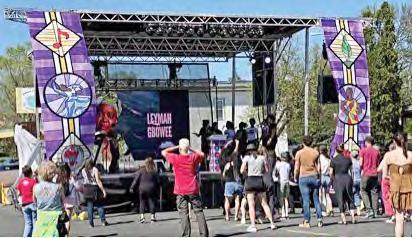
“Beyoncé Mass,” George Floyd Square, May 14, 2022.
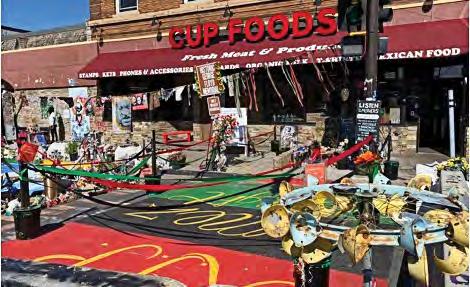
Memorials to George Floyd and other victims of police violence. George Floyd Square, Minneapolis, MN.
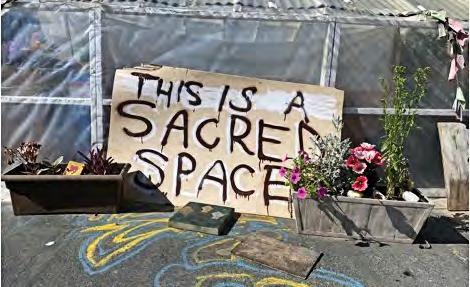
“This is a Sacred Space.” Handmade sign outside of Cup Foods in George Floyd Square, Minneapolis, MN. get clear about the stakes before we again utter mere lip service to the Rev. Dr. King’s vision.
...From The Beloved p26 theology of replacement germinating in white supremacy. We white Christians must figure out how to drag ourselves and our peers to kneel at the altar of repentance. We must confess our complicity in the heretical and only half-unconscious belief that God has ordained whites to replace—that is to kill and displace—others and that, once accomplished, white dominance is to be perpetually preserved as the divinely approved state of affairs. Here’s a simple test to assess our communities. If our pastors and
Sunday School leaders did not talk this Sunday about the ten human beings killed by white supremacy and justified by a depraved vision of
European Christendom, we are responsible. If even our confrontations with our congregations about our complicit silence are met with a collective shrug, white supremacy is being blessed by our apathy. The last words I heard while sitting on Oheyawahi with a group of white evangelicals came from the Rev. Jim Bear Jacobs, a member of the Stockbridge-Munsee Mohican Nation and the director of racial justice for the Minnesota Council of Churches:
I don’t need white Christians to be smarter. I need them to be better.
Through local activism, 125 acres of that sacred hill—including the land on which I sat Saturday—have been protected from additional desecration and development by being placed on the National Register of Historic Places. Under the watch of a local nonprofit, the land is being restored to an oak savannah, slowly healing from the wounds of the past. The belief that America is a kind of promised land for European white Christians (a view held, by the way, by 52% of white evangelical Protestants and by more than one-third of white mainline Protestants and white Catholics) cannot coexist with the beloved community. We have to choose between these incompatible visions of America: one that replaces, one that shares, one that kills, one that heals. ❏ ❏ ❏
